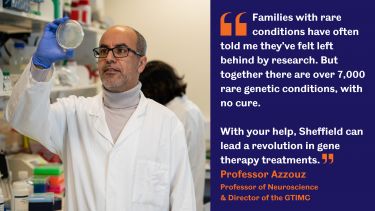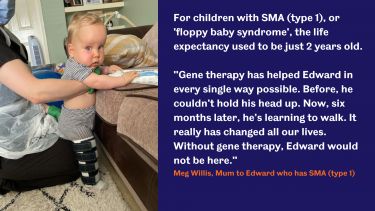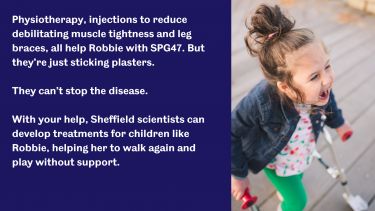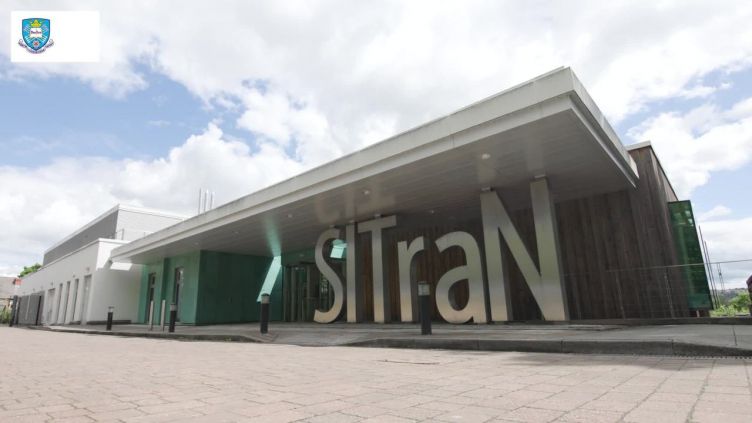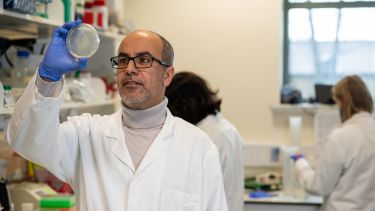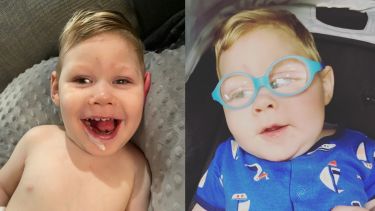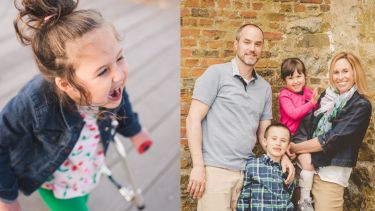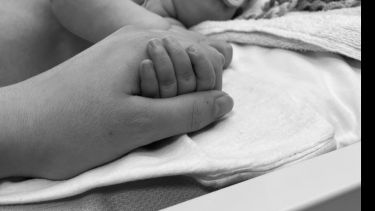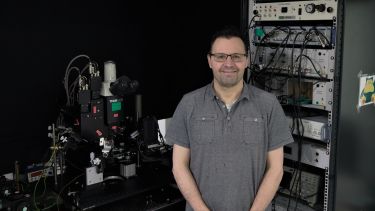Will you help us treat incurable conditions?
Sheffield is a place of innovation. And, with your help, this innovation could change lives. The University of Sheffield has the power to cure devastating genetic conditions.
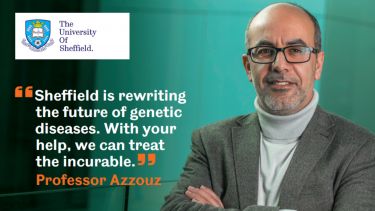
Our new Gene Therapy Innovation and Manufacturing Centre (GTIMC) is opening soon. It will help us develop treatments for previously incurable diseases.
All that's missing is a bioreactor for the lab to help speed up research and advance clinical trials. With the support of alumni, staff and friends of Sheffield, we're aiming to raise £200,000 by the end of July to purchase this special equipment.
Your support will bring hope to people coping with the devastating impact of genetic conditions. People like Robbie, and her family.
After Robbie's diagnosis, I would wake up every day and suddenly remember. It felt like a crushing weight. We had to find our inner strength to pick ourselves up and fight.
Having the University of Sheffield focus on this research gave us a spark of hope. It's been fuelling us ever since. A treatment would be a dream come true.
We’ve experienced one of the worst things that could happen in our lives. But suddenly, you start to see the best of humanity. Not just the researchers, but the community of supporters.
People step up. And the support is comforting.
Kasey Edwards
Mother to Robbie who has the rare disease SPG47
Sheffield is uniquely placed to lead a revolution in gene therapy.
Gene therapy replaces, repairs or switches-off faulty genes. Helping to stop, and even reverse, the damage caused by these awful diseases.
The researchers behind the Sheffield team have already helped to develop a gene therapy treatment for babies like Edward with Spinal Muscular Atrophy.
It’s no exaggeration to say that gene therapy is already saving lives. With your support, Sheffield can help treat even more people.
How you'll help
Your support won’t just help people with rare diseases. This vital piece of equipment will further research for common conditions too. From dementia and MND, to hearing loss and even cancer.
When you choose to make a gift to this appeal, the ripple effect is huge. You’re helping to reduce national healthcare costs, by attacking the root cause of disease. You’re inspiring a young researcher with the best equipment. You’re bringing hope to a family, who for so long has been left waiting in the dark. And you’re helping us all to live healthier, happier lives.
Help us to meet our £200,000 fundraising target by 31 July and get the first lab in the GTIMC up and running.
You’ll help us produce treatments for patients in clinical trials much sooner and give hope to families.
Meet the research team
Find out more about the people behind the research and discover how they're personally fundraising to support the appeal
- What is genetic disease research?
-
Researchers at Sheffield are aiming to uncover the mysteries of disease and develop gene therapy treatments for previously incurable conditions. But what is a genetic disease? And how will research help to treat those living with a genetic disease?
- COL4A1 - Brooks’ story
-
Brooks Ward, aged two, was diagnosed with COL4A1 shortly after birth. This rare genetic disease causes ‘fragile’ blood vessels and has affected Brooks’ heart, brain and vision. As well as causing him constant, painful spasms and a weakened immune system.
Brooks’ parents, Blair and Dustin, will stop at nothing to find a way of helping their son and all those affected by genetic diseases.
- SPG47 - Robbie’s story
-
Robbie Edwards, aged eight, was diagnosed with SPG47 when she was just a toddler. This genetic disease slowly degenerates the muscles and can cause developmental delays and epilepsy. Desperate for a treatment, Robbie’s family met with Professor Mimoun Azzouz from the University of Sheffield. His research has the potential to treat SPG47 through gene therapy.
There is finally a spark of hope, which fuels the Edwards family to this day.
- Spinal Muscular Atrophy - a success story
-
Every year around 100 babies are born in the UK with Spinal Muscular Atrophy (SMA). This neuromuscular disease is one of the most common genetic causes of death in childhood. And without treatment, it causes unbelievable heartache for parents and families.
However, the discovery of a pioneering treatment for the condition is now saving lives. And this incredible story is proof of what revolutionary gene therapy can do.
- Age-related hearing loss
-
Age-related hearing loss, otherwise known as Presbycusis, is the most common sensory disorder. It is estimated that by 2050, it will affect almost one billion people.
Walter Marcotti, a Professor of Sensory Neuroscience at the University of Sheffield, describes the process of age-related hearing loss.
He says: “We lose sensory cells that detect sound, without which there is no sound processing. If you lose a portion of these cells but you are quick enough to implement cochlear implants, then you can still preserve some of the ear.
But the problem with age-related hearing loss is that you lose not only the sensory cells but also the fibre that goes from the ear to the brain. Even if you shout in someone’s ear or implement a hearing device there is nothing that can move the sound from the ear to the brain. And that is one of the major issues that we have with aged related hearing loss.”
Aged related hearing loss causes elderly people to feel isolated as they struggle to socialise with others.
This can lead to conditions such as depression, and research shows there is a link between age-related hearing loss and neurodegenerative conditions such as Alzheimer’s.
Currently, there is no cure for age-related hearing loss as Professor Marcotti explains: “When you go to the hospital and they diagnose you with age related hearing loss, it is already too late, because the equipment currently used in the ENT clinic is not sophisticated enough to detect the early signs of age-related hearing loss.”
However, there is hope that with further research, Age-related hearing loss can be delayed or even prevented.
The construction of the Gene Therapy Innovation and Manufacturing Centre (GTIMC) in Sheffield and bioreactor appeal will allow scientists to translate their research and apply it to humans.
If one day a treatment to prevent or delay age-related hearing loss were to be found, there is no doubt the treatment would be life-changing for millions of people across the world.


